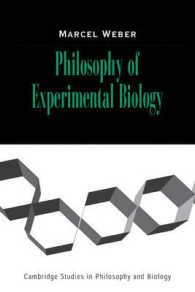- ホーム
- > 洋書
- > ドイツ書
- > Mathematics, Sciences & Technology
- > Technology
- > construction & environment engineering
基本説明
学術研究と持続可能な技術的な解決法を実装した現実の成功例の両方から導かれた最も優れた事例を紹介するハンドブック。持続可能な生産、製品、サービス、消費を主要なテーマとする一方で、スマートマテリアル、廃電気・電子製品のリサイクル、水野利用、太陽電池、製品のライフサイクル、輸送、逆生産などの重要な話題も収録。
Full Description
As global society confronts the challenges of diminishing resources, ecological degradation, and climate change, engineers play a crucial role designing and building technologies and products that fulfil our needs for utility and sustainability. The Handbook of Sustainable Engineering equips readers with the context and the best practices derived from both academic research and practical examples of successful implementations of sustainable technical solutions. The handbook's content revolves around the main themes of sustainable production, products, service systems and consumption while addressing key assets based on new materials, optimized resource management, and new energy sources. Contributions reflect a focus on state-of-the art insights into employing smart materials, recycling e-waste, water utilization, solar cells, product lifecycles, transportation and reverse manufacturing. Supportive of this, underlying issues such as engineering education, consumer behaviour and the regulatory climate complete the handbook's comprehensive treatment of the problems and most promising solutions.
Contents
Education and Outreach: Introduction.- Blueprints for Teaching Ecodesign and Sustainability to University Students.-Ecodesign in Swiss Machining Industry: A Collaborative Learning Process for Effective Outreach and Education.- Implementing New Teaching Models at the Massachusetts Institute of Technology.- Teaching Old Disciplines New Tricks: Sustainable Engineering Education.- Youth Encounter on Sustainability: A Transdisciplinary, Multicultural, and Immersive Education Program.- Transdisciplinary Approaches to Engineering R&D: Importance of Understanding Values and Culture.- Sustainable Water: Introduction.- Chlorine Self-Production Plant Solution for Effluent Water to be Used in Irrigation in Gaza Strip.- Fundamental Toxicology Methods and Resources for Assessing Water-related Contamination.- Micro Hydro in Emergency Situations: A Sustainable Energy Solution at La Realidad (Chiapas,Mexico).- Groundwater Contamination: Role of health sciences in tackling.- Sustainable Earth System Engineering: Incentives and Perspectives.- Sustainable Rehabilitation ofWater Infrastructures in Southern Iraq After the Second GulfWar.- SustainableWater Management in Response to Global Changes.- Sustainable Production and Sustainable Products: Introduction.- Ecodesign Strategies: A Missing Link in Ecodesign.- Environmental Quality Function Deployment for Sustainable Products.- Green PCB Manufacturing Technologies.- Eco-Packaging Development: Integrated Design Approaches.- Material Flow Cost Accounting: Significance and Practical Approach.- Product Life Cycle Assessment (PLCA) and Product Carbon Footprint (PCF).- Remanufacturing.- Reuse of Components and Products: "Qualified as Good as New".- Supply Chain Management for Sustainability.- Sustainable Design by Systematic Innovation Tools (TRIZ, CAI, SI, and Biomimetics).- Sustainable Product Design and Development: TPI-Based Idea Generation Method for Eco-Business Planning and Eco-Product Development.- Structural Complexity Management in Sustainable Engineering.- Sustainable Production: Eco-efficiency of Manufacturing Process.- Product Service Systems and Sustainable Consumption Toward Sustainability: Introduction.- Advanced Japanese Service Design: From Elements to Relations.- Design for Sustainability (DfS): Interface of Sustainable Production and Consumption.- Engineering PSS (Product/Service Systems) Toward Sustainability: Review of Research.- Eco-business Planning: Idea Generation Method.- Life Cycle Simulation for Sustainable Product Service Systems.- Modeling Services and Service-Centered PSS Design.- Product Design Considerations for Improved Integrated Product/Service Offerings.- Sustainable Consumption.- Sustainable Design Engineering: Design as a Key Driver in Sustainable Product and Business Development.- Sustainable PSS in Automotive Industry.- Policy and Decision-Making, and Management for Sustainable Engineering: Introduction.- Sustainable Technology Development: Backcasting and Scenarios.- Changing Energy Demand Behavior: Potential of Demand-Side Management.- Engineers and Community: How Sustainable Engineering Depends on Engineers' Views of People.- Impact of New Technologies: How to Assess the Intended and Unintended Effects of New Technologies?.- Life Cycle Thinking for Improved Resource Management: LCA or ?.- New BusinessModels for Sustainable Development.- Strategies for Sustainable Technologies: Innovation in Systems, Products, and Services.- Successful Contextual Technology Transfer and Determinants of Culture.- Energy Sources of the Future: Introduction.- Biomass Energy Field.- Energy from Water.- Ensuring Sustainability of Bioenergy in Practice.- Geothermal Energy.- Renewability of Energy Resources, Energy Vectors, and Energy Technologies forMobility.- Solar Energy: Harvesting the Sun's Energy for Sustainable Future.- Wind.- New Materials: Introduction.- Advanced Energy Devices: Lithium Ion Battery and High Energy Capacitor.- Advanced Materials for Fuel Cells.- Alternative Materials Development Utilizing Advanced Nanotechnology.- Biopolymers for Environmental Applications: Highly Functional Polylactic Acid Composites Used for Durable Products.- Computational Materials Science and Computer-aided Materials Design and Processing.- Mechanisms of Organisms as Environmentally Friendly Materials Design Tools.- Thermodynamics and Resource Consumption: Concepts,Methodologies, and the Case of Copper








